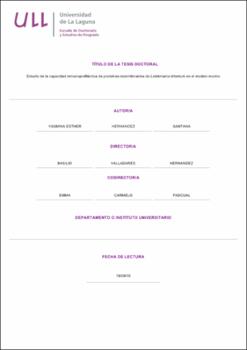Estudio de la capacidad inmunoprofiláctica de proteínas recombinantes de Leishmania infantum en el modelo murino
Date
2016Abstract
In this PhD Thesis, four proteins that are over-expressed in the infective cellular phase of the parasite L. infantum (STPKA, STPK, PP2B and PABP3) were purified to immunize BALB/c mice in order to study their protective capacity against VL. Three proteins induced a strong humoral response in mice, rLiSTPKA, rLiSTPK and rLiPABP3, but not rLiPP2B. Furthermore, the protein rLiPABP3 was the only one that induced a significant decreased of the parasite load both in spleen and liver of mice before 2 months post-infection with the parasite.
In order to determine the effects of the immunisation with rLiPABP3 on the immune system of these mice, gene expression of 106 immune system-related genes was determined in the spleen of control, immunised and infected mice. The expression levels were compared with the gene expression data from control groups. The results showed that, along the whole experiment, rLiPABP3 promotes the inhibition of the inflammatory immune response in the spleen of infected mice. Furthermore, it was not observed any clearly polarized adaptive immune response to a particular cell type. One month after infection, the previously immunized animals showed over-expression of Il2rb, what makes us think that rLiPABP3 could stimulate the presence of memory T cells.
In more advanced stages of infection, although we cannot observe a clear differentiation of a specific population of effector T lymphocytes, down-regulation of the gene encoding TNF-alpha was observed. This finding, together with the up-regulation of gene Cxcr4 and the absence of changes in the expression of the gene Ccr7, drives us to think that immunization not only keeps the micro-architecture of the spleen, but also promotes the successful migration of DCs from the MZ to the PALS, allowing the correct presentation of antigens to T cells and their subsequent activation, generating a protective immune response. En esta Tesis Doctoral, cuatro proteínas que están sobre-expresadas en las fases infectivas del ciclo celular de L. infantum (STPKA, STPK, PP2B and PABP3) fueron purificadas para inmunizar ratones BALB/c, con el interés de estudiar su posible capacidad protectora contra la VL. Tres de ellas indujeron una fuerte respuesta humoral en los ratones, rLiSTPKA, rLiSTPK y rLiPABP3, a diferencia de la proteína rLiPP2B. Además, la rLiPABP3 fue la única que indujo una disminución significativa de la carga parasitara tanto en bazo como en hígado 2 meses después de la infección experimental con el parásito.
Con el objetivo de determinar los efectos que la inmunización con rLiPABP3 tenía sobre el sistema inmune murino, se determinó la expresión génica de 106 genes relacionados con el sistema inmune en ratones control, inmunizados e infectados. Los niveles de expresión génica fueron comparados con los obtenidos para los grupos control. Los resultados mostraron que durante todo el experimento la proteína rLiPABP3 promueve la inhibición de la respuesta inmune inflamatoria en el bazo de los ratones infectados. Además, no se observa una respuesta adaptiva claramente polarizada hacia un tipo concreto.
Un mes después de la infeccion, en los animales previamente inmunizados se observa la sobre-expresion de Il2rb lo que nos hace pensar que rLiPABP3 podría estimular la presencia de linfocitos T memoria.
En fases más avanzadas de la infección, a pesar de que no observamos una clara diferenciación de una población concreta de linfocitos T efectores, sí observamos la infra-expresión del gen codificante del TNF-alfa, lo que unido a la sobre-expresión del gen Cxcr4 y la ausencia de cambios de la expresión del gen Ccr7 nos hace pensar que la inmunización no sólo mantiene la micro-arquitectura del bazo, sino que también promueve la correcta migración de las DCs desde la MZ hasta el PALS.




